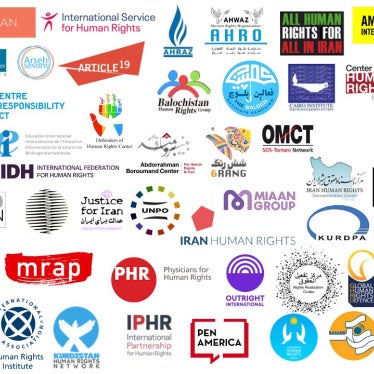The Israeli military’s destruction of a Palestinian media office in Gaza City Monday night had no justification under international law, Human Rights Watch said today. The helicopter gunship attack was the third air strike against Palestinian media in the past two months.
“The clear intent of these attacks is to silence local Palestinian media,” said Sarah Leah Whitson, executive director of Human Rights Watch’s Middle East and North Africa Division. “These senseless strikes must stop.”
According to eyewitnesses interviewed by Human Rights Watch, the attack took place around 10:45 pm on June 28 on an 11-story building in the center of Gaza City that houses the offices of local media, as well as CNN, BBC, al-Jazeera and German ARD Television. Three missiles struck and destroyed the al-Jeel press agency on the third floor, empty at the time, and a fourth hit the floor above. The attack lightly injured two Palestinian workers and damaged several other offices in the building. Neither eyewitnesses nor the Israeli Defense Force (IDF) reported any gunfire or hostilities from the building.
The Israeli raid came hours after home-made rockets fired from the Gaza Strip killed a 49-year-old man and a 4-year-old boy in the nearby Israeli town of Sderot. Human Rights Watch said that such indiscriminate attacks on civilian areas constitute a clear breach of international humanitarian law, but they cannot justify strikes against civilian objects.
The IDF said it targeted “a structure which was used by the Hamas terrorist organization in Gaza City.” The building was “a communications center which maintained constant contact with terrorists,” a statement said, and had distributed “incitement material” from Hamas.
The al-Jeel agency services various Arabic-language media, including Islam Online, MBC in Dubai, Al-Nur Radio in Lebanon and the BBC Arabic Service. The owner and manager, Mustafa al-Sawaf, told Human Rights Watch that he is an Islamist, but does not belong to any political party, including Hamas. He maintains contact with all major Palestinian groups as part of his routine journalistic work.
Palestinian political leaders have visited al-Jeel for interviews, including from Hamas and Islamic Jihad, Sawaf and other journalists said. They also visited other media in the building, such as al-Jazeera and the BBC.
Under international humanitarian law, a media outlet can not be targeted unless it is making an effective contribution to military action, such as by transmitting orders to an armed group, and its destruction or neutralization offers a definite military advantage. When asked by Human Rights Watch, the Israeli military provided no evidence to suggest that al-Jeel or any other media in the building were directing or otherwise contributing directly to armed activities.
“The Israeli military cannot bomb Palestinian newspapers or radio stations because it does not like their point of view,” said Whitson. “Particularly in a conflict, press freedom is absolutely vital.”
The air strike on the al-Jeel office was the third Israeli attack against media in Gaza City in the past two months. According to the Gaza-based Palestinian Centre for Human Rights, on May 2 helicopter gunships attacked the offices of the al-Aqsa broadcasting station. On May 16, gunships bombed the weekly newspaper al-Resala in the al-Nasr neighborhood of Gaza City, wounding two.







